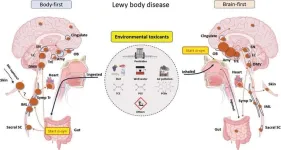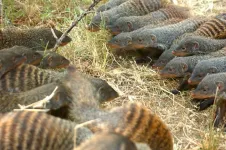(Press-News.org) People who use willpower to overcome temptations and achieve their goals are perceived as more trustworthy than those who use strategies that involve external incentives or deterrents – such as swear jars or internet-blocking apps – according to research published by the American Psychological Association.
“The knowledge that people can use external commitment strategies to overcome self-control problems has existed in some form for thousands of years. Since at least the time of Homer and Odysseus, the focus has primarily been on the efficacy of these strategies for the person choosing to engage in them,” said lead author Ariella Kristal, PhD, of Columbia University. “This prior work has demonstrated, for example, that Odysseus made the right decision to tie himself to the mast rather than attempting to use willpower to resist the sirens in the moment.”
Known as commitment strategies, these approaches have been shown to improve success for a variety of goals, including smoking cessation, weight loss, academic achievement and saving money, according to Kristal. Despite the benefits of commitment strategies, though, little research has been done on how they affect others’ perceptions of people using them.
To better understand how people’s use of commitment strategies over willpower affects others’ perceptions of them, Kristal and her co-author, Julian Zlatev, PhD, of Harvard Business School, conducted a series of online experiments involving more than 2,800 participants from the United States.
The research was published in the Journal of Personality and Social Psychology.
In most of the experiments, participants were presented with a hypothetical situation involving individuals who attempted to achieve a goal using willpower or a commitment strategy. In one experiment, they were asked to rate the integrity of hypothetical individuals who used willpower to avoid an unwanted behavior (e.g., eating junk food or drinking alcohol) versus paying $5 every time they engaged in the unwanted behavior. In another scenario, hypothetical individuals either used willpower or an app to avoid distracting websites like Facebook or Instagram.
Overall, individuals who were described as using commitment strategies to achieve their goals were judged to be less trustworthy than those who used willpower alone.
In two experiments, researchers found that participants were more likely to rate hypothetical users of commitment strategies as less trustworthy, even though the participants recognized the strategies were more effective than willpower alone. In another, participants were less likely to choose an external commitment strategy if they thought others might find out.
“People appear particularly hesitant to adopt commitment strategies when their use will be made public and, while not as high, people’s resistance continues to remain elevated even when the use of strategies will be kept private,” said Kristal. “This occurs despite the fact that people do recognize and acknowledge the benefits of these commitment strategies.”
The researchers believe that the choice to use a commitment strategy signals to others a deficiency in an individual’s character. That is, people believe those who require external aid (as opposed to using just willpower) are more likely to have failed in the past and therefore are less capable of overcoming self-control problems on their own.
“Past failures of self-control can be seen by others as moral failures. Because morality is an important component of integrity in particular, and trustworthiness more broadly, people who rely on commitment strategies may be viewed as less trustworthy than those who simply use willpower,” said Kristal.
These findings have important implications for developing programs and initiatives that rely on external strategies to help people achieve their goals, according to Kristal. By examining the role of interpersonal judgments in self-control strategy choice, we can begin to understand why people may fail to adopt these beneficial strategies and how to better promote effective strategy use.
ARTICLE: “Going beyond the self in self-control: Interpersonal consequences of commitment strategies,” by Ariella Kristal, PhD, Columbia University Business School, and Julian Zlatev, PhD, Harvard Business School. Journal of Personality and Social Psychology, published online April 11, 2024.
CONTACT: Ariella Kristal can be contacted at ask2304@columbia.edu and Julian Zlatev can be contacted at jzlatev@hbs.edu.
The American Psychological Association, in Washington, D.C., is the largest scientific and professional organization representing psychology in the United States. APA’s membership includes over 157,000 researchers, educators, clinicians, consultants and students. Through its divisions in 54 subfields of psychology and affiliations with 60 state, territorial and Canadian provincial associations, APA works to advance the creation, communication and application of psychological knowledge to benefit society and improve people’s lives.
END
People who use willpower alone to achieve goals, resist temptation, deemed more trustworthy
Why people are reluctant to use incentives, deterrents, even when they know they work
2024-04-11
ELSE PRESS RELEASES FROM THIS DATE:
New study shows effect of socio-economic factors—housing, food, neighborhood—to predict diabetic patients’ risk of heart failure
2024-04-11
CLEVELAND—A recent study by Case Western Reserve University used national data from U.S. military veterans with diabetes to validate and modify a widely accepted model used to predict the risk of heart failure in diabetic patients.
The model, called the WATCH-DM score, is used to predict the likelihood of heart failure in diabetes patients within five years.
But because it overlooks the influence of social determinants of health‚ such as housing, food and a patient’s neighborhood, the researchers used a social deprivation index (SDI), a multi-component summary score, to adjust the WATCH-DM score.
The SDI, introduced by the Robert ...
Mapped: 33 new big game migrations across American West
2024-04-11
RESTON, Va. — A new set of maps that document the movements of ungulates was published today in the fourth volume of the Ungulate Migrations of the Western United States. The maps in this collaborative U.S. Geological Survey report series reveal the migration routes and critical ranges used by ungulates, or hooved mammals, in the western U.S., furthering scientists’ understanding of the geography of big game migrations.
The new volume, “Ungulate Migrations of the Western United States: Volume 4,” documents 33 mule deer, ...
Can we crack the code of cartilage?
2024-04-11
Can Jos Malda crack the code of cartilage?
In our aging society, healing joint problems is becoming increasingly important. To do this, cartilage damage must become repairable. But so far it has proven impossible to recreate the intricate internal structure of cartilage. Professor Jos Malda has now received an ERC Advanced grant of €2.5 million to crack that code.
Bringing biology and technology together
Throughout his career, Jos Malda has been concerned with the interface between biology and technology. It took him from studying Bioprocess Engineering in Wageningen to ...
Moments of clarity in the fog of dementia
2024-04-11
A recent Mayo Clinic study published in Alzheimer's & Dementia: The Journal of the Alzheimer's Association investigated lucid episodes in people living with later stages of dementia, providing insights into how these occurrences reveal themselves.
The findings showed that 75% of people having lucid episodes were reported to have Alzheimer’s Disease as opposed to other forms of dementia.
Researchers define lucid episodes as unexpected, spontaneous, meaningful and relevant communication from a ...
Heart transplant recipient discovers a calling for advocacy, support for others
2024-04-11
11 April, Prague, Czech Republic—Glen Kelley’s journey as a heart transplant recipient came full circle today in Prague, as he addressed attendees of the Annual Meeting and Scientific Sessions of the International Society for Heart and Lung Transplantation (ISHLT), including members of his own care teams.
As a high school senior outside of Peoria, Illinois, Kelley was diagnosed with stage-4 Hodgkin’s lymphoma and underwent eight months of chemotherapy and radiation. After 10 months in remission, the ...
On World Parkinson’s Day, a new theory emerges on the disease’s origins and spread
2024-04-11
The nose or the gut? For the past two decades, the scientific community has debated the wellspring of the toxic proteins at the source of Parkinson’s disease. In 2003, a German pathologist, Heiko Braak, MD, first proposed that the disease begins outside the brain. More recently, Per Borghammer, MD, with Aarhus University Hospital in Denmark, and his colleagues argue that the disease is the result of processes that start in either the brain’s smell center (brain-first) or the body’s intestinal tract (body-first).
A new hypothesis paper appearing in the Journal of Parkinson’s ...
ERC wants to see what shapes the stories AI tells us
2024-04-11
Professor Jill Walker Rettberg, Co-Director of the Centre for Digital Narrative at the University of Bergen, is awarded an ERC Advanced Grant for the project AI STORIES. The grant consists of 2.5 million Euro over 5 years. This is Rettberg's second ERC Grant.
“The AI STORIES project builds on the premise that storytelling is central to human culture, with narratives shaping our understanding of the world. We will study artificial intelligence and how it creates new narratives,” says Rettberg.
Generative AI has been dubbed ...
New project explores warfare in animal societies
2024-04-11
A major new research project will investigate how and why groups of animals from the same species fight one another.
By focussing on warlike species – mongooses and termites – researchers aim to understand how evolution can lead to extreme aggression between groups, the consequences of this and the factors that can lead to peace.
The results will help to explain why violence between rival groups evolves in some species but not others, or between some groups and not others – with implications for our understanding of human evolution.
The research team, led by Professor ...
Mirta Galesic awarded ERC Advanced Grant
2024-04-11
[Vienna, April 11, 2024] – The European Research Council (ERC) has awarded an Advanced Grant to Mirta Galesic, a resident scientist at the Complexity Science Hub (CSH), to study the intricate workings of collective adaptation. The project aims to provide insights into why collectives – from families to entire societies – can be stuck in deadlocks about important problems, such as resolving long-standing political conflicts; or why they sometimes appear incapable of finding seemingly obvious solutions, such ...
Twinkle twinkle baby star, 'sneezes' tell us how you are
2024-04-11
Fukuoka, Japan—Kyushu University researchers have shed new light into a critical question on how baby stars develop. Using the ALMA radio telescope in Chile, the team found that in its infancy, the protostellar disk that surrounds a baby star discharges plumes of dust, gas, and electromagnetic energy. These 'sneezes,' as the researchers describe them, release the magnetic flux within the protostellar disk, and may be a vital part of star formation. Their findings were published in The Astrophysical Journal.
Stars, including our Sun, all develop from what are called stellar nurseries, large ...
LAST 30 PRESS RELEASES:
Scientists deliver new molecule for getting DNA into cells
Study reveals insights about brain regions linked to OCD, informing potential treatments
Does ocean saltiness influence El Niño?
2026 Young Investigators: ONR celebrates new talent tackling warfighter challenges
Genetics help explain who gets the ‘telltale tingle’ from music, art and literature
Many Americans misunderstand medical aid in dying laws
Researchers publish landmark infectious disease study in ‘Science’
New NSF award supports innovative role-playing game approach to strengthening research security in academia
Kumar named to ACMA Emerging Leaders Program for 2026
AI language models could transform aquatic environmental risk assessment
New isotope tools reveal hidden pathways reshaping the global nitrogen cycle
Study reveals how antibiotic structure controls removal from water using biochar
Why chronic pain lasts longer in women: Immune cells offer clues
Toxic exposure creates epigenetic disease risk over 20 generations
More time spent on social media linked to steroid use intentions among boys and men
New study suggests a “kick it while it’s down” approach to cancer treatment could improve cure rates
Milken Institute, Ann Theodore Foundation launch new grant to support clinical trial for potential sarcoidosis treatment
New strategies boost effectiveness of CAR-NK therapy against cancer
Study: Adolescent cannabis use linked to doubling risk of psychotic and bipolar disorders
Invisible harms: drug-related deaths spike after hurricanes and tropical storms
Adolescent cannabis use and risk of psychotic, bipolar, depressive, and anxiety disorders
Anxiety, depression, and care barriers in adults with intellectual and developmental disabilities
Study: Anxiety, gloom often accompany intellectual deficits
Massage Therapy Foundation awards $300,000 research grant to the University of Denver
Gastrointestinal toxicity linked to targeted cancer therapies in the United States
Countdown to the Bial Award in Biomedicine 2025
Blood marker from dementia research could help track aging across the animal world
Birds change altitude to survive epic journeys across deserts and seas
Here's why you need a backup for the map on your phone
ACS Central Science | Researchers from Insilico Medicine and Lilly publish foundational vision for fully autonomous “Prompt-to-Drug” pharmaceutical R&D
[Press-News.org] People who use willpower alone to achieve goals, resist temptation, deemed more trustworthyWhy people are reluctant to use incentives, deterrents, even when they know they work






